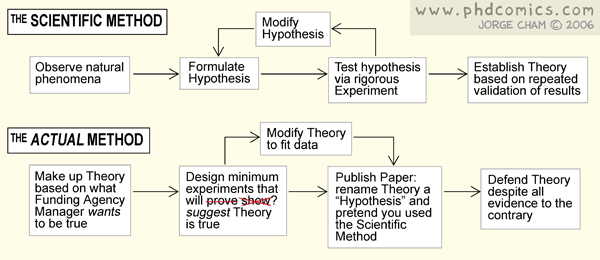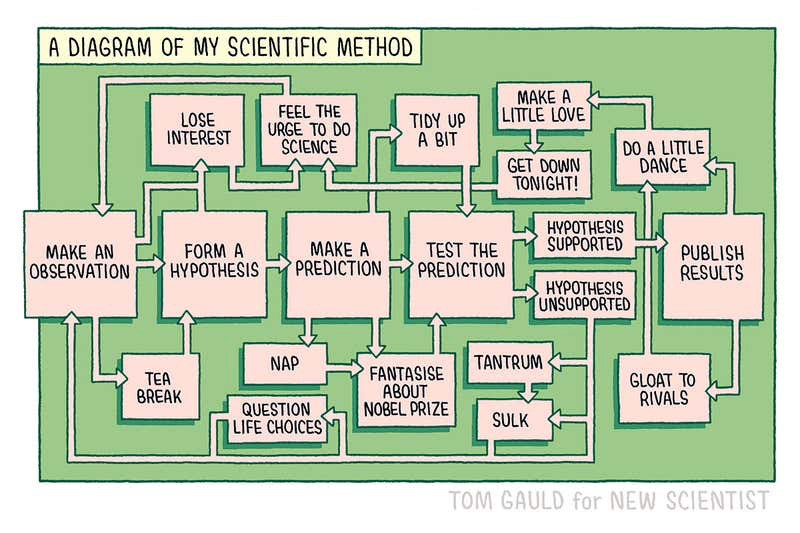Where did the scientific method go?
… And can we please bring it back?
Contributed by Marie-Amélie Boucher (Université de Sherbrooke, Canada)
I like the scientific method. I like it because it makes us focus on the acquisition of new knowledge following a rigorous path and does not devalue results that go against initial expectations. However, it seems to me that in hydrology, like in many applied sciences we focus mostly on reaching research objectives, or goals.
Objective-centered research: what is the problem with research objectives?
Usually, if you have an objective, you want to reach it. You want to loose 10 pounds. You want to learn to cook Indian food. You want to « evaluate and correct the errors in the discharge curves for the Bonnard channel* ». But what if nothing works? What if, despite changing your methodology several times, you can never reach the objective(s) that you initially set out? Will you still be willing to share the results with your peers?
“Piled Higher and Deeper” by Jorge Cham www.phdcomics.com This comic can also be found here and is used with permission from the author.
« Can failure stories contribute to hydrological science »? That’s precisely the question that was asked more than 10 years ago by a group of researchers. They held a workshop in Paris in 2008, where people would present their « Hydrological monsters », or ideas that didn’t work out as expected. A journal article was published following this workshop, where the authors mention that «failures are seldom communicated in scientific journal publications. Scientific articles focus almost exclusively on success stories» and «It takes any number of dead-end explorations before one hits on a suitable way to move forward.»
A first option to avoid failing to reach your objective is to make it vague or very general. Something along the line of «study the importance of X in ensemble forecasting». But that’s not very helpful, is it?
A second option, better in my opinion, is to use the scientific method and structure your research around hypothesis testing.
Hypothesis testing in hydrology
There are no objectives to reach in the scientific method. You observe a phenomena (or a specific problem with a forecasting system, etc.), you formulate a hypothesis, you design an experiment to test your hypothesis and you draw conclusions. You may modify your hypothesis afterwards and perform new experiments. In any case, you can’t really fail. You may or may not be able to support your hypothesis, but neither outcome has a negative connotation, and either can be worthy to be shared with peers if it provides new knowledge.
This comic can also be found here and is reproduced with permission from Tom Gauld
« I don’t/can’t have a hypothesis »
I have discussed my partisanship for the scientific method with many colleagues and students. There are two objections that I hear often, the first one being: « I don’t have a hypothesis » or «it doesn’t apply to my field of research».
I think neither is true. You always have some belief or anticipation about the outcome of your project, even unconsciously. However, becoming comfortable at formulating a hypothesis takes time and practice because we are not used to it, which brings me to the second objection.
It’s not how it’s done
I have heard, once, that centering a research project on hypothesis testing would be «too risky». I was a co-PI in a grant proposal and the PI thought that if we didn’t comply with the objective-centered research culture, we wouldn’t get the grant. This is not how it’s done. This is not what the evaluation panel expects.
Indeed, most funding agencies (at least here in Canada) require that research objectives be specified in proposals. This «tradition» of objective-centered research also applies to scientific literature, but from time to time, I find papers where researchers state their hypothesis (see for instance McMillan et al. 2011; Schröter et al., 2014), or in some case both objectives and hypotheses (e.g. Adam and Lettenmaier, 2008; Arsenault et al. 2014).
Even if it goes slightly against the norm, I believe that following the scientific method and emphasizing hypothesis rather than objectives could help advance hydrological science and research more impartial by facilitating the publication of experiments that could otherwise have been perceived negatively.
So, what do you think?
- Is « objective-centered research » as bad as I think?
- How do you deal with constraints imposed by traditions when you want to do something a little different?
*Yep, it’s from my own past research!


0 comments